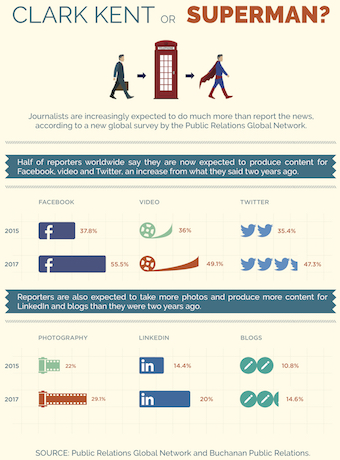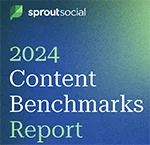The press faces growing pressure for their stories to make a splash across social media channels, and more reporters are now required to juggle various multimedia requirements and utilize this content in the stories they produce, according to a worldwide media survey by global PR network PRGN.
The survey, which asked members of the press to assess how their reporting responsibilities have changed over the last several years and to break down how their stories are distributed across print, social, digital and visual channels, revealed that social media requirements for reporters have witnessed a sharp uptick.
Namely, the survey found that 55.5 percent of reporters are now required to post content to Facebook (up from 37.8 percent in 2015); 47.3 percent are required to Tweet (up from 35.4 percent); 20 percent now post content to LinkedIn (up from 14.4 percent); and 14.6 percent are now straddled with blogging requirements (up from 10.8 percent).
Reporters are also required to provide far more visual content compared to years prior: 49 percent said their jobs now demand video (compared to 36 percent two years ago) and 29.1 percent said they need to provide photos (versus 22 percent two years ago).
Overall, an overwhelming majority — 89 percent — of reporters are now required to provide basic online content. By comparison, only about 57 percent said they’re required to produce content for print. This represents a decrease of more than a 10 percent from the survey’s findings two years ago (about 68 percent).
The survey also uncovered some interesting insights regarding reporters’ favored vetting processes, their preferred methods for conducting interviews and how they handle fact-checking duties.
When it comes to how reporters determine whether a CEO is a qualified or credible source, the survey found 85 percent of reporters assess the CEO’s industry or market knowledge, 53 percent analyze their professional track record and 41 percent consider past news coverage. A clear majority — 86.7 percent — said past media coverage of the CEO is a primary consideration in determining that executive’s credibility.
More than 75 percent of reporters refer to the company’s website when writing a story. Interestingly, only 63 percent said they rely on information supplied by a PR agency, and less than 11 percent said they consider these materials their first source.
On the subject of interviews, more than a third — 33 percent — said they never offer email interviews, though 62.5 percent said they’ll conduct an email interview via this method in certain situations.
The survey also found that more than two-thirds of reporters will allow their sources or PR agencies to review quotes before publication at least in some cases, with 24 percent claiming they often allow quote reviews and 34 percent claiming they occasionally allow such reviews. Nearly a third — 29.7 percent — said they never allow this.
PRGN’s survey was designed and vetted by the network and conducted through a point person in each of PRGN’s partner offices to gather results from the media they work with in their markets. The survey polled reporters from around the globe between July and September.



 What if companies could harness the fury of online outrage into a force for good? This is precisely where companies can start turning the trolls into brand champions.
What if companies could harness the fury of online outrage into a force for good? This is precisely where companies can start turning the trolls into brand champions. Audiences interacted with brand content far more often on Facebook and Instagram in 2023 than they did via X (formerly Twitter), according to a report that tracked engagement trends across different social networks.
Audiences interacted with brand content far more often on Facebook and Instagram in 2023 than they did via X (formerly Twitter), according to a report that tracked engagement trends across different social networks. Can public relations help counteract the dissension fostered by the power of digital platforms to spread hate, fear and confusion?
Can public relations help counteract the dissension fostered by the power of digital platforms to spread hate, fear and confusion? The number of Americans who get their news from TikTok has quadrupled in the last three years, according to a recent Pew Research Center report.
The number of Americans who get their news from TikTok has quadrupled in the last three years, according to a recent Pew Research Center report.


 Have a comment? Send it to
Have a comment? Send it to 
No comments have been submitted for this story yet.